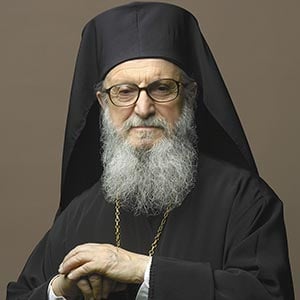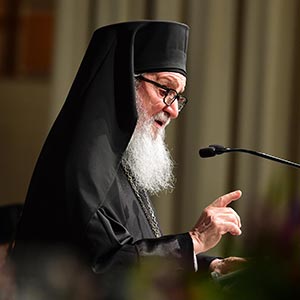We continue our examination of the term "Gather," as used in the theme of our most recent Clergy-Laity Congress, "Gather My People to My Home." In our last reflection, we directed our attention toward gathering the "disconnected" Orthodox Christians, namely, those Orthodox Christians who for one reason or another over the passing of time, have lost what had once been for them a close connection to the Church. This month, we focus our task of gathering as it pertains to the so-called "unchurched."
The term "unchurched" differs in scope from the category of the "disconnected" Orthodox Christians, for it describes a varying array of different life experiences belonging to different people. The term "unchurched" represents a broader sociological distinction by which we mean people who, unlike the "disconnected" Orthodox Christians, have never at all had the experience of growing up within families or other social communities connected to the Church, familiar with the Gospel of Jesus Christ, or, perhaps, affiliated at all with any religious faith. Thus, as we reflect upon those who are among the "unchurched," and our task of "gathering" the unchurched to God's Home, we are readying ourselves as Orthodox Christians to more directly engage a wider part of our general population with the Gospel of Jesus Christ.
This engagement is a two-phase task, consisting of first identifying the "unchurched," and then developing effective and ethically proper methods to "gather" them to God's Home, consistent with the theme and spirit of our Clergy-Laity Congress. The first phrase of this task, i.e. identifying the "unchurched," begins most naturally in our immediate environment. Consider as examples, the numerous people with whom we work, our friends, and others whom we might see regularly in our lives and whom we may know well. Consider how many of these people whom we personally know fall into the category of the "unchurched," as described above. Beyond our immediate environment, coming into contact and conversation with the "unchurched" can also extend to strangers whom we meet, such as when we travel to neighboring cities, states, or foreign countries. Because of this, our encounter with the unchurched is a frequent scenario; and, thus, our efforts to consciously empathize with the life conditions of others, so that that we may more keenly identify the unchurched, should run parallel to this frequency.
Our ability to empathize with the realities of others implicates the second phase of our engagement with them of the Gospel, namely, our developing effective and ethical ways to "gather" the unchurched to God's Home. By effective, we mean ways of gathering the unchurched by communicating the Gospel of Jesus Christ to them with eloquence and accuracy. By ethical, we mean ways of gathering the unchurched that do not employ proselytizing, casting moral judgment on others because of their own beliefs, or using tactics that are deceptive or pressuring.
Here, one beautiful example from the Bible that comes to mind is the story of Philip and the Ethiopian official, which we read in the Acts of the Apostles (8:26-40). In this text, we note the gentility of the manner by which Philip asked the official if he understood what he was reading, namely the prophet Isaiah, 'Do you understand what you are reading?' (v.30). Philip's single, very gentle question initiates a remarkable discussion, which leads the Ethiopian official to the point of asking Philip to baptize him.
This dynamic exchange between the Apostle Philip and the Ethiopian official presents to us a very powerful model of gathering the unchurched. Regardless of where others might be in their relationship to the Church or to any religion, this story serves as an excellent teaching tool of "gathering" because it provides universally applicable principles in preaching the message of the Gospel with effectiveness and the highest ethical standards. It is a model of gentility, and an example of the power, presence, and guidance of the Holy Spirit in the lives of all those who are faithful heralds of the Gospel. It is also a model that portrays to us the well known truth that for any person's decision to be authentic and lasting, it must be made by that person freely and upon his own initiative.
Of course, the position of the Ethiopian official of the book of Acts in his relationship to a life of faith is not always the typical one that we face in our encounters with the so-called "unchurched." We must note, that he is presented to us as a man of faith, a man connected to religion, as he was coming from Jerusalem. But, the Ethiopian is also presented as one who is in a state of great spiritual thirst, a thirst which could only be quenched by the water of baptism after he came to learn about the Gospel of Jesus Christ for the very first time through the Apostle Philip. It is in this way that the he can fit into the category of the "unchurched."
In our contemporary world, several of those who can be properly categorized as among the "unchurched" are close to the mentality and disposition of the Ethiopian, but several of them are not. Distinctions of this nature only underscore the importance of developing our sensitivities to understanding and appreciating the diverse life situations of others, remembering that the realm of a person and his faith represents the most intimate of sanctuaries. Therefore, it is our sacred responsibility as Orthodox Christians to share the message of the Gospel of Jesus Christ with others with sensitivity, love, and genuine interest in their well-being, just as we would kindly offer to others who are thirsty the glass of water of the Gospel, knowing firsthand its refreshing quality and comfort that it provides. This refreshment and comfort is the message of the good news, the Gospel of Jesus Christ. Let us offer it lovingly and share it abundantly with others as we "gather" to God's Home those who may be among the "unchurched."
† DEMETRIOS
Archbishop of America

